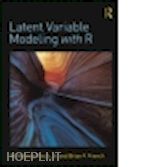This book demonstrates how to conduct latent variable modeling (LVM) in R by highlighting the features of each model, their specialized uses, examples, sample code and output, and an interpretation of the results. Each chapter features a detailed example including the analysis of the data using R, the relevant theory, the assumptions underlying the model, and other statistical details to help readers better understand the models and interpret the results. Every R command necessary for conducting the analyses is described along with the resulting output which provides readers with a template to follow when they apply the methods to their own data. The basic information pertinent to each model, the newest developments in these areas, and the relevant R code to use them are reviewed. Each chapter also features an introduction, summary, and suggested readings. A glossary of the text’s boldfaced key terms and key R commands serve as helpful resources. The book is accompanied by a website with exercises, an answer key, and the in-text example data sets. Latent Variable Modeling with R: -Provides some examples that use messy data providing a more realistic situation readers will encounter with their own data. -Reviews a wide range of LVMs including factor analysis, structural equation modeling, item response theory, and mixture models and advanced topics such as fitting nonlinear structural equation models, nonparametric item response theory models, and mixture regression models. -Demonstrates how data simulation can help researchers better understand statistical methods and assist in selecting the necessary sample size prior to collecting data. -www.routledge.com/9780415832458 provides exercises that apply the models along with annotated R output answer keys and the data that corresponds to the in-text examples so readers can replicate the results and check their work. The book opens with basic instructions in how to use R to read data, download functions, and conduct basic analyses. From there, each chapter is dedicated to a different latent variable model including exploratory and confirmatory factor analysis (CFA), structural equation modeling (SEM), multiple groups CFA/SEM, least squares estimation, growth curve models, mixture models, item response theory (both dichotomous and polytomous items), differential item functioning (DIF), and correspondance analysis. The book concludes with a discussion of how data simulation can be used to better understand the workings of a statistical method and assist researchers in deciding on the necessary sample size prior to collecting data. A mixture of independently developed R code along with available libraries for simulating latent models in R are provided so readers can use these simulations to analyze data using the methods introduced in the previous chapters. Intended for use in graduate or advanced undergraduate courses in latent variable modeling, factor analysis, structural equation modeling, item response theory, measurement, or multivariate statistics taught in psychology, education, human development, and social and health sciences, researchers in these fields also appreciate this book’s practical approach. The book provides sufficient conceptual background information to serve as a standalone text. Familiarity with basic statistical concepts is assumed but basic knowledge of R is not.











